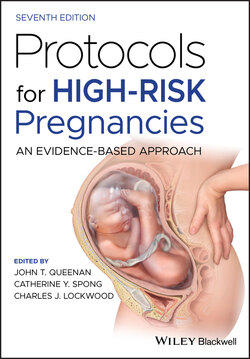Читать книгу Protocols for High-Risk Pregnancies - Группа авторов - Страница 25
Pharmacotherapy
ОглавлениеPharmaceutical tobacco smoking cessation aids such as nicotine replacement therapy (NRT), varenicline, or bupropion SR are efficacious as first‐line agents in the general nonpregnant population. The use of these medications is not yet routinely recommended in pregnancy, as there are inconclusive data on their effectiveness and safety. NRT is available as transdermal patch, inhaler, nasal spray, chewing gum, or lozenge. Most existing data for smoking cessation in pregnancy are based on NRT delivery methods such as patches, but a randomized clinical trial (RCT) comparing nicotine inhalers and placebo for pregnant smokers was recently published. This RCT showed no benefit of nicotine inhalers for smoking cessation in pregnancy, although there was notably a lower rate of preterm birth if the woman used the nicotine inhaler compared to placebo. In general, NRT should be used with extreme caution and women should be warned of uncertain side effects in pregnancy.
Bupropion SR is an atypical antidepressant that has been approved by the FDA for use in smoking cessation. It is contraindicated in patients with bulimia, anorexia nervosa, use of MAO inhibitors within the previous 14 days, or a known or history of seizure disorder. It carries a black box warning due to an association of antidepressant medications with suicidality in children, adolescents, and young adults under the age of 24 years. Varenicline is approved for smoking cessation in the general population. Serious neuropsychiatric symptoms have been associated with its use including agitation, depression, and suicidality. Although there have been several small studies performed evaluating the safety of varenicline in pregnancy with no evidence of teratogenicity documented, these data must be interpreted with caution.
To date, contingency management, or the use of tangible reinforcement to promote desired behaviors, is the most promising technique to achieve smoking cessation and has been shown to be an effective motivational tool for overcoming other addictions, including alcohol and substance abuse.
An increasing proportion of smokers are now using e‐cigarettes, either for nicotine delivery or as a measure to assist with smoking cessation. Although e‐cigarettes may contain fewer harmful substances than cigarettes, they are not considered safe to use during pregnancy. In addition to the impact of the nicotine administered, there are some flavorings that may be harmful to the developing fetus. It should be noted that at this time, the Centers for Disease Control and Prevention (CDC) recommend against the use of e‐cigarette products given the risks associated with such use.
